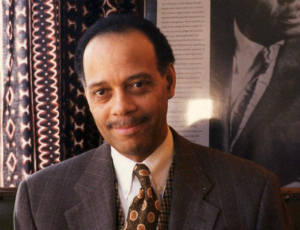As part of One Book, One Chicago, we're featuring a series of original essays titled Chicago Heroes: Real & Imagined! Each month through spring 2015, meet a local hero as introduced by a local author. Chicago authors will reflect on heroes from the past, present or even imagined in these new short essays. This month's essay is from Haki R. Madhubuti.
A leading poet and one of the architects of the Black Arts Movement, Haki R. Madhubuti—publisher, editor and educator—has been a pivotal figure in the development of a strong Black literary tradition. He has published more than 31 books (some under his former name, Don L. Lee) and is one of the world’s bestselling authors of poetry and nonfiction. He is an award-winning poet and recipient of the National Endowment for the Arts and National Endowment for the Humanities fellowships, the American Book Award, an Illinois Arts Council Award, the Studs Terkel Humanities Service Award and others. Madhubuti was a cultural son who was mentored by Ms. Brooks for over 35 years. He was her publisher at Third World Press and the Founder and Director Emeritus of the Gwendolyn Brooks Center for Black Literature and Creative Writing which hosted the annual Gwendolyn Brooks Writers Conference at Chicago State University for twenty years. His latest book is Honoring Genius: Gwendolyn Brooks : the Narrative of Craft, Art, Kindness and Justice : Poems.
Gwendolyn Brooks: The Voice of the Unheard
Somewhere between genius and remarkable, in the neighborhood of brilliant and unforgettable, as unique word giver and kindhearted is Gwendolyn Brooks. She was our able witness and deep participant emerging as our truest chronicler of deadly and good times. Gwendolyn Brooks was, first, a questioner of accepted “knowledge”; second, she equipped herself to be one of the finest poets of any century; and third, she was mentor and lifeline to thousands of poets, children and writers seeking an island of hope in this most difficult of arts.
Gwendolyn Brooks was always a seeker of facts within facts, refusing to tap-dance with the devil. For over sixty-five years she was our supreme example of a conscientious poet. To read Gwendolyn Brooks, the complete body of her work, is like taking an intellectual journey through 20th century America, enumerating a complete portrait of the Black experience. She, in a definitive language—writing from both sides of the cultural tracks, detailed the life of her people as only a committed artist-activist could do.
If a person from another planet, continent or culture wishes to gain insight into the inner workings, the comings and goings of Black people in America, an excellent place to begin for a formal or informal education is with the poetry of Gwendolyn Brooks. As with the writings of Langston Hughes, Margaret Walker, Robert Hayden, Melvin B. Tolson, Zora Neale Hurston and others, Ms. Brooks work is culturally specific and incisive. As the first Black writer to win the Pulitzer Prize (1950) she published over twenty books of poetry, children’s’ verse, writing manuals, one novel and two autobiographies.
In 1985, she became the 29th appointment as Consultant in Poetry to the Library of Congress (now the Poet Laureate of the United States), and along her life’s journey was awarded over eighty honorary degrees as well as membership in the American Academy of Arts and Letters and many other distinguished awards. She served as the Distinguished Professor of English at Chicago State University and as Poet Laureate of Illinois from 1969 until 2000. As a part of her self-defined responsibility, Ms. Brooks sponsored the Illinois Poet Laureate Writing Contest for young people for over twenty-five years, using cash awards from her own pockets. She loved all children and young people as in the poem “Speech to the Young, Speech to the Progress Toward,” which is dedicated to her own children, Nora and Henry III.
Say to them,
say to the down-keepers,
the sun-slappers,
the self-soilers,
the harmony-hushers,
“Even if you are not ready for day
it cannot always be night.”
You will be right.
For that is the hard home-run.
Live not for battles won.
Live not for the-end-of-the-song.
Live in the along.
To read her works, better yet, to study her wonderful poetry is not a small detour among the unknown. Gwendolyn Brooks’ work is not a digression from main street America. Her subjects—the determined many, the strong-willed, the focused and single-minded in their mission—bring meaning and definition to a maturing America. Her poetry does not waiver from the fact that America would not be America without the dogged or insistent contributions of Black people. From the enslaved Africans to the 21st century freed people, she writes of our investment in creating an America for all, especially the “little people.” In her work we discover many “main streets”; yes, there may be different accents, the ingredients and seasoning of our food will vary, the drape of our clothes and the melody of our hearts will distinguish us. However, all hearts beat to the language of growth. In her poem, “Paul Robeson,” she displays a powerful sense of the urgency of caring and adulthood;
That time
we all heard it,
cool and clear,
cutting across the hot grit of the day.
The major Voice.
The adult Voice
forgoing Rolling River,
forgoing tearful tale of bale and barge
and other symptoms of an old despond.
Warning, in music words
devout and large,
that we are each other’s
harvest:
we are each other’s
business:
we are each other’s
magnitude and bond.
Gwendolyn Brooks is our beginning, in-between and period. Her work represents a full view of her people, not always accommodating or elegant, but always abundant with love and necessary tomorrows.




Add a comment to: Guest Blog: Poet Haki R. Madhubuti on Gwendolyn Brooks